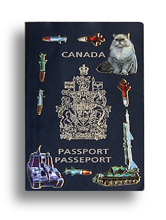
|
Lorna Mills and Sally McKay
Digital Media Tree this blog's archive OVVLvverk Lorna Mills: Artworks / Persona Volare / contact Sally McKay: GIFS / cv and contact |
View current page
...more recent posts
image from Sergio Prego's intense video at PS1. Stolen from here.
Monster is a word we use to put distance between ourselves and something we don't like. It's a term that's invoked when people do bad things, a knee-jerk reaction to say: that's not part of me or my world, and absolutely not my responsibility. I have just finished reading two books about monsters by RM Vaughan. Spells is a coming-of-age story from the dark side. It's set in St. John, New Brunswick, a dark, conservative town that several of my close friends have had the misfortune to grow up in. Spells takes root in the most horrid pits of adolescent shame and self-loathing, and spills back and forth between witchcraft and neurotic delusion. I like it because it addresses head-on the presence of monstrosity in commonplace, everyday existence. I also like it because, while the main character is gay, it is not his homosexuality per se that offends and frightens him, but his whole entire, fetid, pubescent self.
The Monster Trilogy is a collection of three short plays, monologues, that starts with Susan Smith. Remember her? She pushed her car into the lake and drowned her kids, then fingered a fictional "black man with a toque." I remember the headline "MONSTER" when the truth came out about what she'd done, and I've been mildly obsessed* ever since. In "The Susan Smith Tapes", RM Vaughan puts words into her mouth: "Sometimes I get hungry, right after supper, right on a full stomach, unsensible hungry, and then I says a little prayer to my angels up on God's lap. Momma hears you, boys, Momma hears your tummies rumblin'. Now you ask God for your supper. Beans and weiners. White bread with brown sugar. And then I ain't hungry no more."
The second play, "A Visitation by Saint Teresa of Avila upon Constable Margaret Chance" is the voice of a cop, who is shaken up because she's discovered that a gruesome murderer/rapist is a distant relative: "[What] if its a gene, right, like a genetic predispatation to kill and it runs in the family? I could pass it on to my boy, Bradley. Maybe I got a thread of this gene -- that's all it takes, one bad link in the chain -- say I'm in the middle of the hot and hornies and the gene kicks in, right, the Kill Gene, kicks right the fuck into my head and I gotta do a violence? I gotta cut off a pair of nuts or an arm or a whole head? Whaddya gonna do, you can't deny your genetic destiny. So, here's the finaly unholy question: am I guilty?"
"Dead Teenagers" is a smoking female Reverend who has recently behaved inappropriatly at a teenager's funeral: "What a mob scene at Kristi Kenner's service. Hundreds of girls from the high school, and each one brought her own candle, or a pink teddy bear, or the worst sort of handmade cards. All this trash piled a mile high on the church steps. The Kenner family did not spend three thousand dollars on quality floral arrangements to have them tarted up with gaudy pink carnations and green women's rights ribbons and plastic unicorns tied to yellow roses."
I like these grim, funny vignettes very much, and Spells is a trip. But my primary interest is RM Vaughan's point of view that monsters are us. I think we do ourselves and each other a disservice when we cast away the undesirable. Enough tossing out our babies with the dirty, stinkin' bathwater.
* far far too much to read about Susan Smith is available here.
According to my friends J&J, people in Pickering, Ontario used to do this to recreate "that puppet from The Dark Crystal." I thought I knew what puppet they meant until I went looking.
I just saw Elephant. ow ow ow. If you are feeling too chipper, this'll deflate the mood in no time. I like it a lot, though, as a document and a marker in time. I like that it is so clearly Columbine, but at the same time clearly fiction. This ain't no mock-u-mentary, but rather knock-down, drag 'em out, expressionistic narrative. The first part of the film, before the shooting started, hit me hard with all the bad, remembered pain and hopelessness of high school. By the time the violence kicked in I was tear-streaked and numb. My own indifference to the bloodshed was in itself the most bleak and, I think (hope), informative part of the experience. I felt similarly about Larry Clark's Kids: painful to sit through but important to see. Now, 9 years later, I am sick of Larry Clark and his self-indulgent, self-serving fetishization of adolescence. And I have felt similarly about Gus Van Sant in the past. But maybe it takes a salacious point of view to provide otherwise clear-eyed, judgement-free pictures of the dark interior of teenager-dom.
Bowling for Columbine is the only place where I've seen a direct connection made between the amorality of youth (which we distance our selves from) to the amorality of the military industrial complex (in which, as adults, we are complicit). While Elephant, is paralysing and despair-inducing, Bowling for Columbine, is a call to action. I'd suggest seeing both.
All that said, here's a good angry rant by Michael Niederman, who hated Elephant and does a very nice job of saying why .